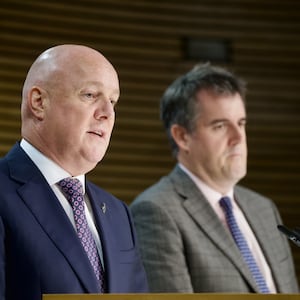Politics
Government Moves to Transition 3.5 Million Vehicles to Road User Charges

The Government has announced significant modifications to the Road User Charges (RUCs) system, anticipating a transition for approximately 3.5 million vehicles from the existing Fuel Excise Duty. This shift is part of a broader strategy to move all vehicles to a road user charge framework, which currently applies to owners of diesel, electric, and heavy vehicles. The elimination of the Fuel Excise Duty is projected to occur in the coming years, aligning with the Government’s commitment to modernise the transport funding structure.
Transport Minister Chris Bishop provided insights into the transition, stating that while discussions have indicated a possible implementation by 2027, no definitive timeline has been established. This cautious approach aims to ensure that the changes are thoroughly considered and not rushed, allowing for a smooth adaptation to the new system.
Legislative Changes to Support Transition
To facilitate this transition, the Government plans to introduce new legislation designed to modernise the existing road user charges framework. These legislative changes will seek to enhance the efficiency and fairness of the charging system, ultimately benefiting both vehicle owners and the broader community. The proposal aims to provide a sustainable funding source for road maintenance and infrastructure development, addressing the evolving needs of the transport network.
The shift away from the traditional petrol tax reflects a growing recognition of the need for a more equitable system that accounts for various vehicle types and their environmental impact. As electric and alternative fuel vehicles become more prevalent, adjusting the funding model is crucial to ensure that all road users contribute fairly to the maintenance of transportation infrastructure.
Implications for Vehicle Owners and the Environment
The transition to RUCs is expected to have varying implications for vehicle owners. For those currently paying the Fuel Excise Duty, the move to a road user charge system may result in different financial obligations based on usage patterns. The Government aims to communicate these changes clearly to ensure that all drivers understand how the new system will operate.
This initiative is also aligned with broader environmental goals, promoting the use of electric and low-emission vehicles. By shifting to a system that encourages sustainable transport solutions, the Government hopes to reduce overall carbon emissions and support the transition to greener technologies.
As the Government prepares for this substantial change in transportation funding, stakeholders across the automotive industry and environmental advocacy groups are poised to closely monitor developments. The success of this transition will hinge on effective communication and stakeholder engagement, ensuring that the new charging system meets the needs of all road users while supporting the nation’s infrastructure goals.
In conclusion, the forthcoming changes to the Road User Charges system signify a pivotal moment in transportation policy, setting the stage for a more sustainable and equitable approach to road funding in the years ahead.
-

 World4 months ago
World4 months agoTest Your Knowledge: Take the Herald’s Afternoon Quiz Today
-

 Sports4 months ago
Sports4 months agoPM Faces Backlash from Fans During Netball Trophy Ceremony
-

 Lifestyle4 months ago
Lifestyle4 months agoDunedin Designers Win Top Award at Hokonui Fashion Event
-

 Entertainment4 months ago
Entertainment4 months agoExperience the Excitement of ‘Chief of War’ in Oʻahu
-

 Sports4 months ago
Sports4 months agoLiam Lawson Launches New Era for Racing Bulls with Strong Start
-

 World5 months ago
World5 months agoCoalition Forms to Preserve Māori Wards in Hawke’s Bay
-

 Health4 months ago
Health4 months agoWalking Faster Offers Major Health Benefits for Older Adults
-

 Lifestyle4 months ago
Lifestyle4 months agoDisney Fan Reveals Dress Code Tips for Park Visitors
-

 Politics4 months ago
Politics4 months agoScots Rally with Humor and Music to Protest Trump’s Visit
-

 Top Stories5 months ago
Top Stories5 months agoUK and India Finalize Trade Deal to Boost Economic Ties
-

 Health2 months ago
Health2 months agoRadio Host Jay-Jay Feeney’s Partner Secures Visa to Stay in NZ
-

 World5 months ago
World5 months agoHuntly Begins Water Pipe Flushing to Resolve Brown Water Issue









